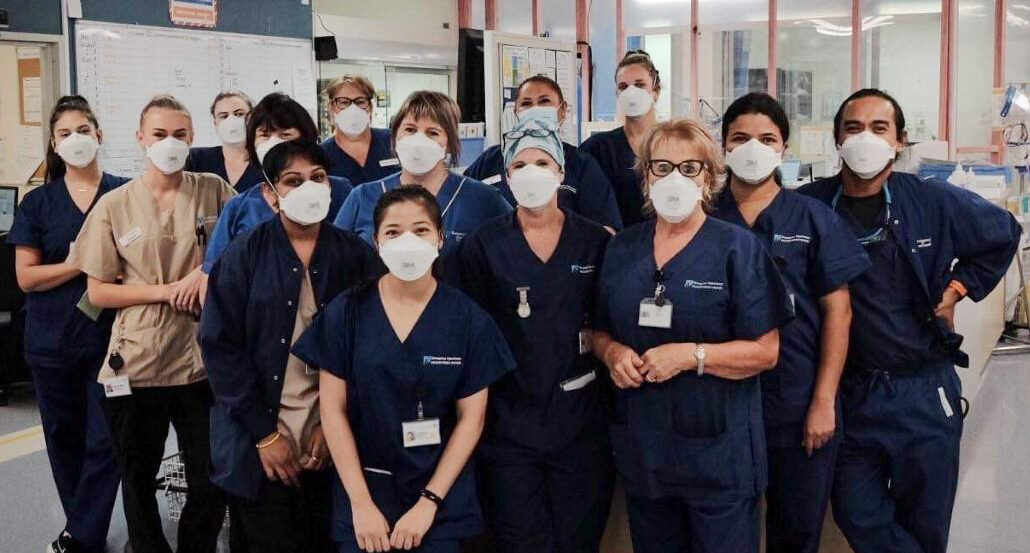The week, in mid-July, when the emergency nursing team at Whangārei Hospital decided to stop picking up extra shifts, we had covered almost 500 hours of extra work to patch roster gaps and sick calls.
We had used casual staff, part-time staff, permanent staff, full-time staff, our clinical nurse educator, our clinical nurse specialist and our clinical nurse manager on the floor to keep the department safe.
The previous nine months, we had worked 12-hour shifts, short changes, 100-plus hour fortnights and more. We navigated building work inside, triaged in cold tents outside, resuscitated in rooms so small you are climbing under equipment to get to the other side of the bed.
We’d been rung, texted and messaged on Facebook on a daily basis to help out. The team were exhausted, angry, tearful, burned out, but unable to stop. We were working in survival mode, our manager as burned out as her team, trying to patch a roster with up to 140 roster gaps each month and 11 full-time equivalent (FTE) nurses down. Nurses from overseas who had been offered jobs in our emergency department (ED) were often unable to get here due to visa delays.
The final straw
We felt defeated and morale was the lowest it had ever been since I started work in the ED eight years ago. The final straw was finding out that some of our casuals and nurses working at other district health boards were getting really good overtime rates for the same work we were doing for goodwill, on normal pay. It broke us.
We started talking about how inconsistent and unfair this was under the newly formed Health NZ. At Whangārei Hospital, overtime only kicks in once you work more than 40 hours a week. As many of our nurses are on 0.8 FTE or less – often for their own health and wellbeing – this means they get nothing extra for working an extra shift.
We discovered from our own doctors that the doctors’ union had negotiated a really good winter plan for their extra hours. This can involve getting eight times as much incentive pay per extra shift as our nurses are now getting under the national winter payment plan.
We started talking to nurses nationally about their situations and discovered a raft of options being offered to cover staffing gaps — ranging from nothing extra until you work 40 hours (like us) to as much as triple time. We went to our management team and asked for overtime — not triple time, but a reasonable and equitable financial incentive to come in on our days off to help.

We were told every district was paying multi-employer collective agreement (MECA) rates only (ie standard rates until 40 hours) and that the other districts denied nurses were getting more. After 10 days of denial, despite us presenting evidence to the contrary, we had had enough. We told our manager we were stopping the extra work and returning to our contracted hours until management acknowledged our roster gaps, recognised the extraordinary work we were doing and listened to our concerns.
Several weeks later, we have made some progress – our managers have finally listened, advocated for us to Health NZ and have tried to support us to fill the gaps. The reality is that they can’t. A winter payment plan has now been introduced for nurses (a $100 incentive payment for an extra shift, plus an on-call and bonus points system), but this still doesn’t offer us what is reasonable for the extra work they need us to do and the issue has shifted to health and well-being.
The inconsistencies and contradictory statements being made about our health and wellbeing only made us angrier. We were told Health NZ couldn’t offer overtime because it would encourage staff to work unsafe hours – but were happy for us to continue working unsafe hours without financial recognition.
The winter plan rolled out with an emphasis on working as many hours as possible, especially night shifts, despite many staff doing those extra hours already working close to full-time FTE.
In stopping, we have discovered that the responsibility to cover our gaps is no longer ours and never should have been.
Despite this, the positives from this group decision to stop picking up extra shifts have been immeasurable. We feel empowered again as a team, we feel stronger from standing together, and we feel able to DO something (by not doing something) and to rest.
In stopping, we have discovered that the responsibility to cover our gaps is no longer ours and never should have been. By covering the thousands of gaps this year, we have just covered up a problem that isn’t ours to shoulder.
Rediscovering normal life
We rediscovered our normal lives. Many nurses remembered that spending more time at home with their children, and with elderly parents, was more important than propping up the department.
Nurses felt able to nurse with enthusiasm again, no longer working exhausted every day and still being asked to do more. It was an important shift to looking after ourselves, so that we could continue looking after others.
It wasn’t an easy decision — it was incredibly stressful to stand by and watch the department try to cope without us. Management scrambled to patch the shifts with directorate staff and ward staff, even closing a ward to help.
I was firmly told that there was no traction in what we were doing but eventually it was clear that it was not possible or sustainable to cover such a high acuity, specialised and high stress area of work without us. We were asked to meet with our executive leadership team to discuss the options, but their options are very limited without the support of Health NZ.
We are still waiting for decisions to be made. However the national conversation has started and NZNO is on board. We have had an incredible amount of support from nurses across New Zealand – they wanted to express their support and stand with us.
The reality is that most nurses feel they are letting their colleagues down by saying no – but when you take action as a group, it is a community responsibility and the result is to push the responsibility uphill to those who are paid for it — the higher levels of management and ultimately the Government.
We have had an incredible amount of support from nurses across New Zealand – they wanted to express their support and stand with us.
Under employment law, the employer is the one responsible for the safety, health and well-being of staff and patients. They are responsible for equitable pay to employees who hold equal skills and qualifications and work in the same space. The Government, as our employer, is responsible for people in its care and nurses should feel assured that Health NZ is not going to stand by and watch patients die because nurses are simply working their contracted hours.
The solution is actually simple. Pay us reasonable overtime above our FTE and many nurses will be willing to work more on a short-term basis until recruitment and training can address the shortfall.
In a business world, it’s a matter of supply and demand. We are in great demand, there is short supply – we have the power to ask for more without striking, without breaking any rules.
If the nurses of New Zealand chose to work their contracted hours, the health system wouldn’t cope — there would be a huge risk to patient lives. The employer has stood back and let us shoulder the responsibility for too long, and fought with us on every small step towards pay equity for this work they demand.
‘Action through inaction’
With the union, we can take a stand by doing nothing — action through inaction. Passively but determinedly demanding what we want – pay equity, back pay, better conditions for our senior nurses and our pregnant women and reasonable, equitable pay for the extraordinary work we are currently expected to do to help Health NZ maintain patient safety and care.
We have the strength to ask calmly, quietly and professionally for what we are worth. We can ask for respect, not just from the public but from our own employers and from the Government.
We can start to shift the historical view of nurses as angels, carers and handmaidens who are willing to give up equitable pay for the sake of goodwill and love. And shift the idea that we are greedy and demanding, taking great chunks of money (which was promised to us) from the taxpayers.
Our doctors support us, they are shocked at our treatment. The most shocking thing to me in the last month was to see the difference in language when you hold the two winter payment plans up together. One was devised before winter, with a focus on how to “support” and “care” for the medical staff over winter, how to “financially incentivise” them to do more in a fair and reasonable way.
The other – given to us as an afterthought when put under pressure, is a complicated and inequitable system of bonus payments — if you can jump through all the hoops and triggers that are needed and actually work out how to claim it.
This clearly indicated to me that nurses really are treated differently in terms of respect and equity, and this view is validated by the doctors who work with us. Right now we are desperately needed, we are expected to work above our FTE and if we don’t, the health system can’t survive, people will either suffer or die.
If our department is covering hundreds of hours a week, imagine the number of extra hours nurses across New Zealand are covering. Imagine the strength in that number. We just have to work together. Maranga Mai.
Rachel Thorn, RN, is a staff nurse and clinical nurse co-ordinator in the Whangārei Hospital emergency department, and an NZNO delegate for ED.





